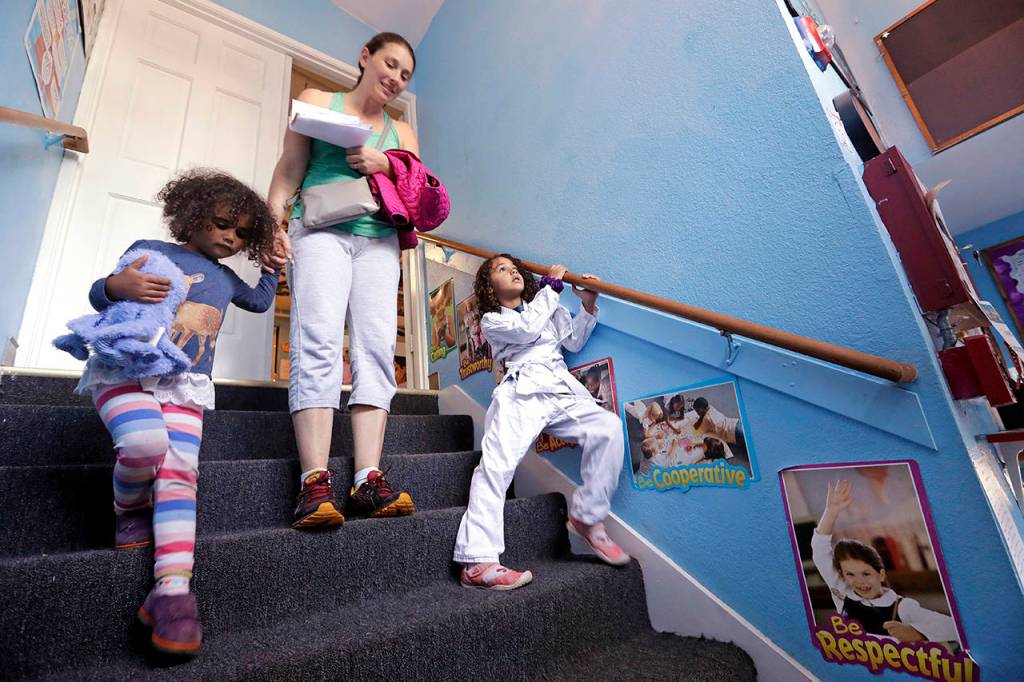Editorial: To restart the economy we need cash and childcare
Published 1:30 am Friday, June 5, 2020


By The Herald Editorial Board
Snohomish County and the rest of the state are continuing a slow county-by-county reawakening of local economies under the state’s Safe Start plan.
Snohomish County could soon hear on approval by the state Department of Health on its request to join about 27 other counties in a move to Phase 2, allowing restaurants and personal service businesses to reopen at 50 percent capacity, among other relaxed restrictions. Meanwhile, six counties have applied to advance to Phase 3, further increasing capacity at many businesses and reopening gyms and theaters.
Even as slow as it is, the increase in activity that results — reopening of businesses closed for weeks, a resumption of some services and a return for more employees to workplaces — is needed to rebuild local and state economies, generating income and tax revenue and returning us closer to where we were before the coronavirus pandemic forced these measures.
We’ll repeat our message from earlier in the week that rousing local and state economies will take more than a slow turning of a dimmer switch; it requires a complex and coordinated response among business owners, workers, residents and public officials. Plans for the restart, notably by the county’s Economic Workforce and Recovery Task Force, are advancing, but two important cogs in that machinery are now in short supply:
Cash and childcare.
On childcare: Noted during recent discussions among the task force’s members is the need to re-open and support childcare facilities, particularly as it remains unclear as to when and to what extent schools will be able to reopen. For many parents, particularly single parents, a return to work will depend on the availability of childcare. As of late March, a childcare organization in the state reported the closure of about 12 percent of childcare facilities since the outbreak began, a loss of slots for some 33,000 children in the state.
U.S. Sen. Patty Murray, D-Washington, and others in the Senate and House have proposed an extension of the block-grant funding first provided in the CARES Act. The Child Care is Essential Act would add $50 billion in funding, helping to reopen and support childcare facilities and provide tuition aid to working families.
“We have long had a child care crisis in this country, but if the federal government doesn’t step up immediately, not only will frontline workers be unable to stay on the job, but families across the country might not have child care providers to return to once our economy opens up,” Murray said in a release.
On cash: The rebuild also requires a continuation of financial assistance already provided under the CARES Act that funded a one-time payment of $1,200 to most Americans and $600 a week in additional unemployment compensation that now expires at the end of July.
As local businesses reopen, those additional funds to individuals are needed to encourage spending and support of those businesses.
It’s a message usually repeated before the holiday shopping season’s Small Business Saturday, but the U.S. Small Business Administration has cited studies that show that for every $100 spent at a small business, about $70 stays in the local economy, supporting other businesses, workers’ paychecks and local governments.
Local businesses, here in Snohomish County and across the country, would benefit directly from another round of such spending, providing real stimulus to local and state economies.
Last month, the U.S. House passed the HEROES Act, which among several provisions would approve another round of $1,200 payments to individuals and continuation of the $600 weekly additional jobless benefits through next January.
Continuation of that aid is needed. Employment will rebound, but slowly. April’s statewide unemployment rate was 15.4 percent; Snohomish County led the county with more than 1 in 5 workers unemployed.
But in addition to that stimulus, the HEROES Act, with a total of some $3 trillion in spending, allocates nearly $1 trillion to provide needed assistance to state, local and tribal governments.
Unlike the federal government, governments at the state, county and municipal level are not allowed to spend more than they take in each year, meaning that those governments as they cope with lost revenue have made or are planning lasting cuts to their employment and the services we depend upon.
By example, the state Legislature is expected to meet in special session later this year to address an estimated $7 billion revenue shortfall, with expectations that agencies will be making at least 15 percent cuts to employment and programs. The City of Everett, especially reliant on sales tax revenue, laid off more than 80 full- and part-time employees in recent weeks, halted popular programs and shut facilities, including the Carl Gipson Senior Center that many seniors rely on to maintain health, nutrition and social connections.
As outlined in a recent release by U.S. Rep. Rick Larsen, D-2nd District, the HEROES Act would provide direct aid to county and municipal governments necessary for continuing important services, such as public health, police, fire and transportation. Locally, the act would allocate $462 million for Snohomish County and $47 million for Island County; and among cities, $46 million for Everett, $27 million for Marysville; $19 million for Lynnwood; and $11 million for Oak Harbor.
That’s money that could help restore and protect city and county services now suspended or threatened with cuts.
Unfortunately, the aid package — really, next to any significant additional aid — has been all but rejected by the U.S. Senate’s Republican leadership, describing it as a “liberal wish list.” Senate Majority Leader Mitch McConnell, R-Ky., has promised only that the next stimulus bill will be smaller than the CARES Act, and it will be the last.
The $2 trillion already spent in the CARES Act is a significant investment of federal spending, but sustaining American families and businesses during the pandemic crisis made it imperative. Now the job ahead of us is to revitalize the local, state and national economy as we wait for a coronavirus vaccine. Legislation that largely adopts the provisions of the HEROES Act and the Child Care is Essential Act will be necessary to rebuilding the economy and protecting the earlier investment of taxpayer money.
Ignoring the need on the slim hopes that enough has already been done could instead condemn the nation’s families, businesses and local governments to years of economic stagnation and unnecessary hardship.




